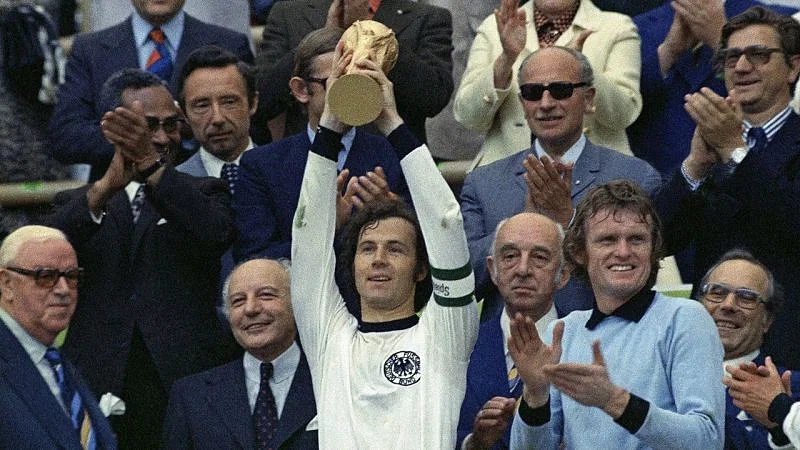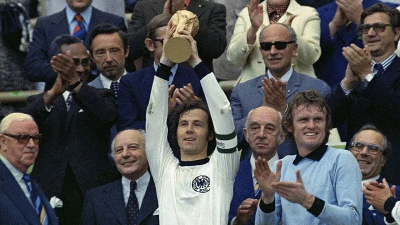German football legend Franz Beckenbauer passed away yesterday, Sunday, at the age of 78, as confirmed by family members to the German news agency (dpa). The family stated in a statement: "With great sadness, we announce that husband and father Franz Beckenbauer died peacefully in his sleep surrounded by family." In turn, German Chancellor Olaf Scholz confirmed on platform "X" that "the World Cup winner as a player and coach: Franz Beckenbauer was one of the greatest footballers in Germany and 'the Kaiser' for many due to the enthusiasm he instilled in generations for German football. We will miss him. Our condolences to his family and friends."
Beckenbauer is considered one of the most famous football players in Germany and the world, gaining fame for his exceptional performance as a sweeper, where he excelled in offensive roles in addition to his defensive duties. He spent most of his professional career at Bayern Munich, leading the team to numerous domestic and international titles. He also shone in his international career with the German national team, winning significant titles including the World Cup in 1974. After retiring, Beckenbauer pursued coaching and successfully won the World Cup with the German national team in 1990. He held many official and administrative positions throughout his life.
### The Kaiser’s Beginnings
The famous player Franz Anton Beckenbauer was born on September 11, 1945, in Munich, the capital of Bavaria, where he lived his childhood under difficult conditions that most Germans faced at the time, as the country was divided into East and West. Beckenbauer loved football from a young age, avidly following key matches, and his passion grew after seeing the German national team defeat Hungary in the 1954 World Cup final. Thus, he quickly decided to join a local team and joined the youth ranks of SC 1906 München. In 1959, he began his long career with FC Bayern Munich.
### Beckenbauer's Personal Life
Franz Beckenbauer married Brigitte in 1966, and they were married for 24 years before separating. The couple had two children, Michael and Stephen, but Stephen died young after suffering from a terminal illness, and he was also a football player. Beckenbauer married Sybille in 1990, and their marriage lasted 14 years, producing a child named Thomas. In 2006, Beckenbauer married Heidi Burmeister, and the couple has two children, Francesca and Noel.
### Facts About the Kaiser
Beckenbauer played 103 international matches for the German national team, scoring 14 goals. He suffered a dislocated shoulder during the 1970 World Cup match between Germany and Italy, but he chose to continue the match. Beckenbauer won the Ballon d'Or in 1972 and 1976 and served as the chairman of Bayern Munich from 2002 to 2009.
### The Kaiser’s Achievements
Beckenbauer made his first appearance with Bayern Munich in 1964, playing alongside prominent players such as Gerd Müller and Sepp Maier, forming the core of a team that dominated domestic and continental competitions in the 1970s. He played as a sweeper but revolutionized the role by contributing to offensive tasks, thus creating a new position known as libero. Beckenbauer led his team to achieve local and European glory, winning the Bundesliga in 1969, 1972, 1973, and 1974, and capturing the European Champions Cup three times in a row between 1974 and 1976, earning him the moniker "Der Kaiser."
In 1977, Beckenbauer joined the New York Cosmos in the United States, where he played alongside Brazilian star Pelé, winning the North American Soccer League three times before returning to Germany to join Hamburg for two years.
Internationally, Beckenbauer was an indispensable player for the German national team. At the age of 21, he participated in the 1966 World Cup in England, helping his teammates reach the final, which they lost to England in extra time after the referee awarded a questionable goal to the hosts. Four years later, Beckenbauer participated in the 1970 World Cup, where he had an outstanding performance, helping his team eliminate England after winning 3-2. In the semi-final, the Germans faced their Italian rivals, resulting in a memorable match that ended in a 4-3 loss for Germany.
These previous defeats did not dampen Beckenbauer's determination, and he returned to participate in the 1974 World Cup held in Germany with the primary goal of securing the title at home. He, along with teammates Maier, Müller, and Breitner, led the national team to the final against the Dutch team led by Johan Cruyff. The match was challenging, as they had to contend with the Dutch team's total football style, but they managed to defeat them 2-1, thus claiming the coveted title.
Beckenbauer retired from playing football in 1981, but he returned three years later to coach the German national team. Despite having no prior coaching experience, he successfully led the Mannschaft to the 1986 World Cup final, where they lost to Argentina 3-2. Four years later, Beckenbauer achieved revenge against Argentina, defeating them in the World Cup final held in Italy. Thus, Beckenbauer became the second person to win the World Cup both as a player and as a coach. After the World Cup, Beckenbauer managed the French team Marseille, then returned as a coach for Bayern Munich, leading them to win the UEFA Cup in 1996.
After retiring from coaching, Beckenbauer served as president of the German Football Association and became the president of the organizing committee for the 2006 World Cup in Germany, being its sports ambassador. In 2009, Beckenbauer was appointed honorary president of Bayern Munich, a position he still holds today.




